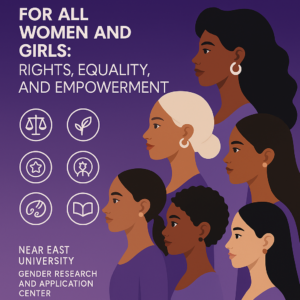
The opening speeches, delivered by Deputy Speaker of the Republic Assembly Fazilet Özdenefe, MP İzlem Gürçağ Altuğra, Retired Chief Justice Narin Ferdi Şefik, Özay Günsel Children’s University Chairperson Anna Günsel, and TOÇAM Director Assoc. Prof. Dr. İzlem Kanlı, emphasized the importance of solidarity and interdisciplinary collaboration in advancing women’s rights. While Fazilet Özdenefe pointed out the underrepresentation of women in decision-making bodies and the need for continued legal and social reform, İzlem Gürçağ Altuğra underlined that “a society where women are peaceful and empowered is one where hope and welfare flourish.” Narin Ferdi Şefik stressed the ongoing gaps in inheritance law and the importance of supporting women candidates based on merit rather than tokenism.
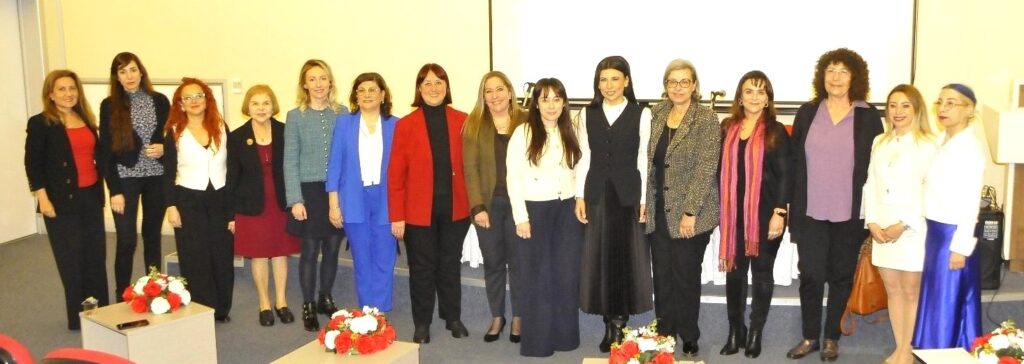
Academically Grounded Sessions
The first session of the event featured a panel titled “Rights, Equality, and Empowerment,” where Prof. Dr. Fatma Güven Lisaniler addressed the economic dimension, Assoc. Prof. Dr. Eylem Ümit Atılgan the legal perspective, Prof. Dr. Nur Köprülü the political aspects, and Assoc. Prof. Dr. Süheyla Üçışık Erbilen the educational angle.
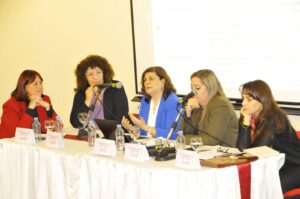
Assoc. Prof. Dr. Eylem Ümit Atılgan focused on the structural limitations of a male-dominated legal system and the importance of legal reforms being accompanied by a transformation in social mindset. She called attention to the persistence of patriarchal interpretations in law enforcement and emphasized that true justice for women requires not only legal texts but also gender-sensitive implementation.
Prof. Dr. Nur Köprülü analyzed the effects of different political regimes on women’s political representation, drawing comparisons from the Middle East and North Africa, and stressed the direct correlation between democratization and gender equality. She noted that despite increasing visibility, women still face significant barriers in accessing leadership roles, often shaped by systemic biases and societal expectations.
Assoc. Prof. Dr. Süheyla Üçışık Erbilen emphasized the need for inclusive approaches in educational policy and curriculum reform to address gender roles and foster equity in learning environments. She highlighted the role of schools in breaking stereotypes and promoting critical thinking from early education onwards.
Honoring the Legacy of Women in Journalism
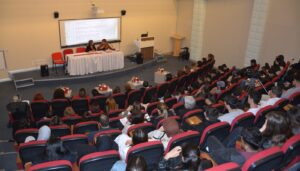
The second session commemorated journalist and former Director of the Turkish News Agency (TAK), Perihan Aziz. Moderated by Asst. Prof. Dr. Özen Çatal, the session included a screening of a documentary prepared by the Women’s Stories Association (KÖDER), followed by a heartfelt presentation by journalist and author Nezire Gürkan. Gürkan reflected on Aziz’s journalistic legacy and her support for women entering the profession, portraying her as a true role model. Her speech offered an intimate glimpse into the structural challenges women journalists faced in the 1970s and 80s, and Aziz’s unique leadership marked by solidarity, resilience, and moral integrity.
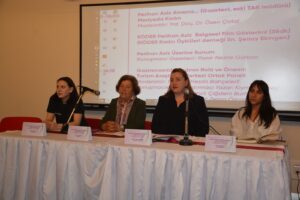
The third session, titled “The Role and Importance of Women in Gastronomy,” was jointly organized by the Gender Research Center and the Tourism Research Center. Moderated by Prof. Dr. Nesrin Bahçelerli, the panel featured researcher and author Kıymet Alibey, entrepreneur Çiğdem Burhan, and demi chef Zehra Özcan.
Kıymet Alibey shared her journey from documenting traditional Cypriot culinary culture to empowering women in rural areas through tourism and local food production. She emphasized the importance of preserving authentic recipes and shared how local women have used food festivals as a platform for visibility and income generation.
Çiğdem Burhan spoke of the physical and psychological challenges she faced in professional kitchens and shared her experience in establishing her own restaurant, emphasizing the vital presence of women in gastronomy. She stressed the need for perseverance, adaptability, and community support in overcoming structural inequalities in the culinary industry.
Zehra Özcan discussed her career path across various culinary sectors, underlining the importance of talent and passion in the kitchen, regardless of gender. She called for solidarity and courage to build an inclusive culinary culture, and reflected on her transition from hot kitchens to à la carte service, highlighting the mental resilience required for women to succeed in high-pressure environments.

Closing with Art and Solidarity
The symposium concluded with the opening of the “International Women’s Day Art Exhibition,” featuring works by artists from the Near East University Faculty of Fine Arts and Design and the Cyprus Museum of Modern Arts. The exhibition was inaugurated by the President of the Turkish Republic of Northern Cyprus (TRNC), Ersin Tatar.